News
Drug Smuggling: Indonesia Executes Four Nigerians, Others
Indonesia has executed eight out of nine drug convicts by firing squad despite last-ditch appeals by Australia’s foreign minister for a stay of execution so that claims of corruption during the trials of two Australian prisoners could be investigated.
The executions were carried out after midnight (17:30 GMT) at Besi prison on Nusakambangan Island, yesterday, after the inmates were given 72-hour notice.
Over the weekend, authorities had asked the nine inmates, which included two Australians, four Nigerian men, one man each from Brazil and Indonesia and a Filipino woman for their last wishes.
However, the execution of the Filipina, Mary Jane Veloso, was delayed at the last minute after one of her recruiters surrendered to police in the Philippines, the attorney general’s spokesman told newsmen late yesterday.
“The execution of Mary Jane Veloso has been postponed because there was a request from the Philippine president related to a perpetrator suspected of human trafficking who surrendered herself in the Philippines,” Tony Spontana, spokesman for the attorney general said.
“Mary Jane has been asked to testify.”
Earlier, Filipino migrants had rallied in Hong Kong on behalf of Velose – a 30-year-old mother of two whose supporters said was tricked into carrying a suitcase loaded with heroin.
Our source said while there was an outpouring of joy among Filipinos that Velose had been spared, there would be a different reaction from Australia after Jakarta rejected last-ditch pleas for clemency.
“The executions could call a diplomatic fallout between Australia and Indonesia just as they did earlier this year when the Netherlands and Brazil recalled their ambassadors after their nationals were killed,” she said.
Amnesty International condemned the executions, saying they showed a “complete disregard for due process and human rights safeguards.”
Some 14 people have now been put to death in Indonesia this year, and the government has announced plans for further executions this year.
The families of the Australian convicts had paid an anguished final visit to their loved ones, yesterday, wailing in grief as ambulances carrying empty white coffins arrived at the prison. Australia’s Foreign Minister, Julie Bishop, told the media that she had received a letter from Indonesia on Monday night that offered no indication of a reprieve for Myuran Sukumaran and Andrew Chan.
Earlier in the day, Bishop had asked for a stay in their executions, saying allegations in the Australian media that their judges had requested money to commute the death sentences were “very serious”.
Indonesian President, Joko Widodo, said that such concerns should have been conveyed a decade ago when the case went through the courts.
A former lawyer of the prisoners, Muhammad Rifan, told Australia’s Fairfax Media on Monday that Indonesian judges had requested more than $100,000 in return for prison terms of less than 20 years.
But Rifan said the judges later told him they had been ordered by senior legal and government members in Jakarta to impose a death penalty, so the deal fell through.
Sukumaran and Chan were members of the so-called Bali Nine who were arrested at the main airport on the holiday island in April 2005 for trying to smuggle 8.3kg of heroin to Australia.
The Indonesian authorities had been tipped off by Australia’s Federal Police.
The seven other members of the Bali Nine, all Australians, have been jailed in Indonesia but do not face the death penalty.
A spokesman for Indonesia’s Foreign Ministry, Armanatha Nasir, said Sukumaran and Chan had been given all the legal avenues to challenge their death sentences.
The country’s attorney-general’s office said the executions of all nine people on death row would proceed this week.
“I think it will happen this week as the preparations are 100 per cent ready now,” spokesman Tony Spontana said.
The prisoners were handed 72 hours’ notice of their executions on Saturday, when representatives of their countries were also advised. Indonesia usually carries out executions at midnight.
The other seven who were informed at the weekend that they would face the firing squad are four Nigerians, an Indonesian, a Brazilian and a Filipina.
Spontana said a tenth prisoner, the Frenchman Sergei Atlaoui, would be spared for now as legal proceedings were still under way.
Among the condemned was a Brazilian man, Rodrigo Gularte, who has been diagnosed by Indonesian medics with schizophrenia, a mental illness.
Gularte, 42, was arrested in 2004 at a Jakarta airport after trying to enter the country with 6kg of cocaine hidden in a surfboard.
He was also sentenced to death in 2005.
Meanwhile, Chan, got married in the prison on Monday, his brother Michael said after attending the wedding.
The marriage was Chan’s “final wish” granted by Indonesian prison authorities.
“Yes there was a celebration inside the prison this afternoon with close family and friends; it’s obviously a special occasion for them,” Michael said.
“Yes, look, it’s tough time but it’s happy time at the same time. We just hope that the president somewhere will find some compassion and mercy for these two, young couple so they can carry on with their lives.”
News
You Failed Nigerians, Falana Slams Power Minister
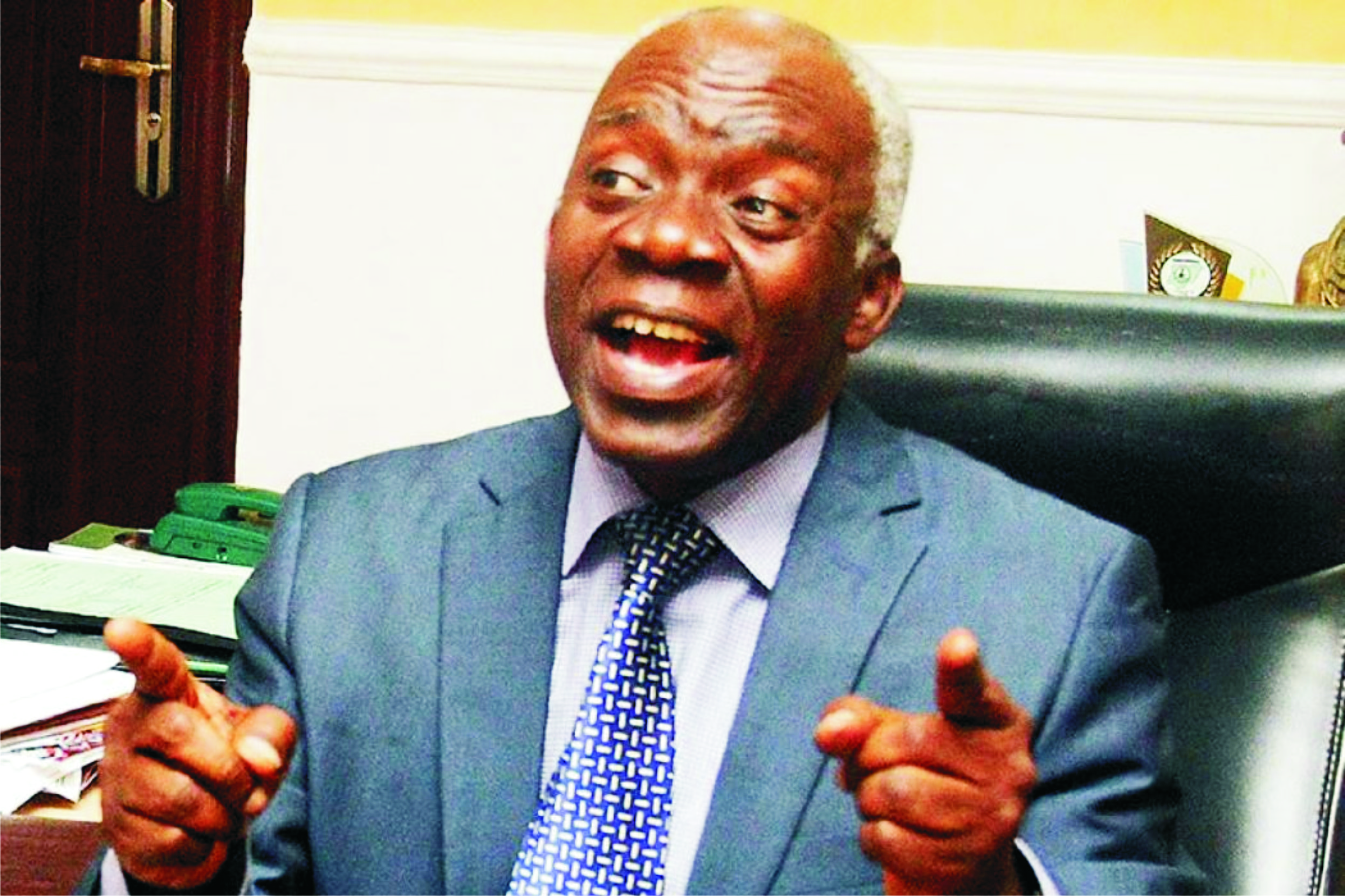
Human rights lawyer, Femi Falana, SAN, has passed a vote of ‘no confidence’ in the Federal Government, saying that the Minister of Power, Adebayo Adelabu, has failed Nigerians.
Falana was reacting to Adelabu’s appearance before the Senate to defend the increase in the electricity tariff and what Nigerians would pay on Monday.
The rights activists also claimed that the move is a policy imposed on the Nigerian government by the International Monetary Funds (IMF) and the World Bank.
Speaking on the Channels TV show on Monday night, Falana said, “The Minister of Power, Mr Adebayo Adelabu has failed to address the question of the illegality of the tariffs.
“Section 116 of the Electricity Act 2023 provides that before an increase can approved and announced, there has to be a public hearing conducted based on the request of the DISCOS to have an increase in the electricity tariffs. That was not done.
“Secondly, neither the minister nor the Nigeria Electricity Regulatory Commission has explained why the impunity that characterised the increase can be allowed.”
Falana also expressed worry over what he described as impunity on the part of the Federal Government and electricity regulatory commission.
““I have already given a notice to the commission because these guys are running Nigeria based on impunity and we can not continue like this. Whence a country claims to operate under the rule of law, all actions of the government, and all actions of individuals must comply with the provisions of relevant laws.
“Secondly, the increase was anchored on the directives of the commission that customers in Band A will have an uninterrupted electricity supply for at least 20 hours a day. That directive has been violated daily. So, on what basis can you justify the increase in the electricity tariffs”, Falana queried.
The human rights lawyer alleged that the Nigerian government is heeding an instruction given to her by the Bretton Wood institutions.
He alleged, “The Honourable Minister of Power is acting the script of the IMF and the World Bank.
“Those two agencies insisted and they continue to insist that the government of Nigeria must remove all subsidies. Fuel subsidy, electricity subsidy and what have you; all social services must be commercialised and priced beyond the reach of the majority of Nigerians.
“So, the government cannot afford to protect the interest of Nigerians where you are implementing the neoliberal policies of the Bretton Wood institutions.”
The Senior Advocate of Nigeria accused Western countries led by the United States of America of double standards.
According to him, they subsidize agriculture, energy, and fuel and offer grants and loans to indigent students while they advise the Nigerian government against doing the same for its citizens.
Following the outrage that greeted the announcement of the tariff increase, Adelabu explained that the action would not affect everyone using electricity as only Band A customers who get about 20 hours of electricity are affected by the hike.
Falana, however, insisted that neither the minister nor the National Electricity Regulatory Commission (NERC) has justified the tariff increase.
The senior lawyer said that Nigerian law gives no room for discrimination against customers by grading them in different bands.
He insisted that the government cannot ask Nigerians to pay differently for the same product even when what has been consistently served to them is darkness.
Following the outrage over the hike, Adelabu on Monday appeared at a one-day investigative hearing on the need to halt the increase in electricity tariff by eleven successor electricity distribution companies amid the biting economic situation in Nigeria.
However, Falana said that nothing will come out of the probe by the Senate.
He advised that the matter has to be taken to court so that the minister and the Attorney General of the Federation can defend the move.
News
1.4m UTME Candidates Scored Below 200 -JAMB
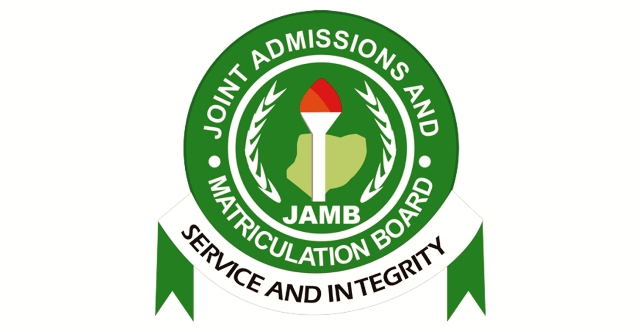
The Joint Admissions and Matriculation Board (JAMB) on Monday, released the results of the 2024 Unified Tertiary Matriculation Examination, showing that 1,402,490 candidates out of 1,842,464 failed to score 200 out of 400 marks.
The number of candidates who failed to score half of the possible marks represents 78 per cent of the candidates whose results were released by JAMB.
Giving a breakdown of the results of the 1,842,464 candidates released, the board’s Registrar, Prof. Ishaq Oloyede, noted that, “8,401 candidates scored 300 and above; 77,070 scored 250 and above; 439,974 scored 200 and above while 1,402,490 scored below 200.”
On naming the top scorers for the 2024 UTME, Oloyede said, “It is common knowledge that the Board has, at various times restated its unwillingness to publish the names of its best-performing candidates, as it considers its UTME as only a ranking examination on account of the other parameters that would constitute what would later be considered the minimum admissible score for candidates seeking admission to tertiary institutions.
“Similarly, because of the different variables adopted by respective institutions, it might be downright impossible to arrive at a single or all-encompassing set of parameters for generating a list of candidates with the highest admissible score as gaining admission remains the ultimate goal. Hence, it might be unrealistic or presumptive to say a particular candidate is the highest scorer given the fact that such a candidate may, in the final analysis, not even be admitted.
“However, owing to public demand and to avoid a repeat of the Mmesoma saga as well as provide a guide for those, who may want to award prizes to this set of high-performing candidates, the Board appeals to all concerned to always verify claims by candidates before offering such awards.”
Oloyede also noted that the results of 64,624 out of the 1,904,189, who sat the examination, were withheld by the board and would be subject to investigation.
He noted that though a total of 1,989,668 registered, a total of 80,810 candidates were absent.
“For the 2024 UTME, 1,989,668 candidates registered including those who registered at foreign centres. The Direct Entry registration is still ongoing.
“Out of a total of 1,989,668 registered candidates, 80,810 were absent. A total of 1,904,189 sat the UTME within the six days of the examination.
“The Board is today releasing the results of 1,842,464 candidates. 64,624 results are under investigation for verification, procedural investigation of candidates, Centre-based investigation and alleged examination misconduct”, he said.
Oloyede also said the Board, at the moment, conducts examination in nine foreign centres namely: Abidjan, Ivory Coast; Addis Ababa, Ethiopia; Buea, Cameroon; Cotonou, Republic of Benin; London, United Kingdom; Jeddah, Saudi Arabia; and Johannesburg, South Africa.
“The essence of this foreign component of the examination is to market our institutions to the outside world as well as ensuring that our universities reflect the universality of academic traditions, among others. The Board is, currently, fine-tuning arrangements for the conduct of the 2024 UTME in these foreign centres,” he explained.
News
Ex-CBN Director Admits Collecting $600,000 Bribe For Emefiele
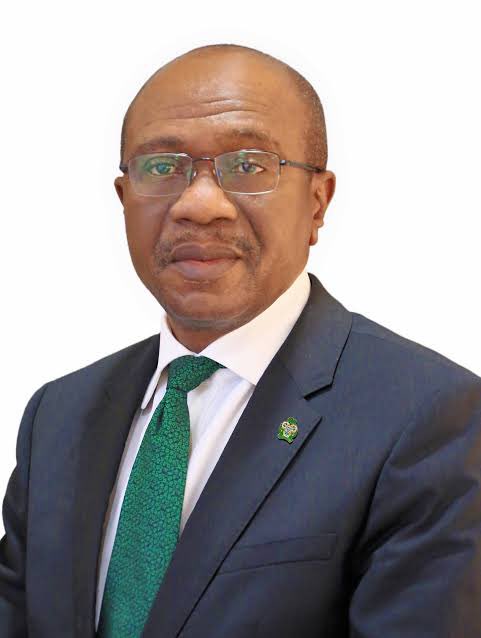
A former Director of Information Technology with the Central Bank of Nigeria, John Ayoh, has alleged that he collected on behalf of the former governor of the apex bank, Godwin Emefiele, a sum of $600,000 in two installments from contractors.
Ayoh, the second witness of the Economic and Financial Crimes Commission (EFCC), disclosed this on Monday while recounting instances where he facilitated the delivery of money to Emefiele, claiming it was for contract awards.
Under cross-examination at the Ikeja Special Offences Court in Lagos by the defence counsel, Olalekan Ojo (SAN), Ayoh admitted to facilitating the alleged bribery under pressure.
The embattled former governor of the apex bank is having many running legal battles both in Abuja and Lagos and is being tried by the EFCC at the Special Offences Court over alleged abuse of office and accepting gratification to the tune of $4.5 billion and N2.8bn.
He was arraigned on April 8, 2024, alongside his co-defendant, Henry Isioma-Omoile, on 26 counts bordering on abuse of office, accepting gratifications, corrupt demand, receiving property, and fraudulently obtaining and conferring corrupt advantage.
Emefiele’s defence, however, challenged the court’s jurisdiction over constitutional matters, urging the quashing of counts one to four and counts eight to 24 against him.
Ayoh, who was led in evidence by the EFCC prosecution counsel, Rotimi Oyedepo (SAN), said the first money he collected on Emefiele’s behalf was $400,000 which his assistant, John Adetola, came to collect at his house in Lekki, Lagos State.
He further told the court that the second bribe of $200,000 was collected at the headquarters of CBN, at the Island office.
He said the money was brought in an envelope, adding that when the delivery person, Victor, was on the bank’s premises, he contacted Emefiele, who insisted on receiving the package directly from Ayoh without involving third parties.
He said when he went to deliver the package, he saw many bank CEOs waiting to see the former apex bank governor.
When questioned if he had ever been involved in any criminal activity, he responded in the negative but admitted that he had facilitated the commission of crime unknowingly.
“I believe I did admit in my statement that I was forced to commit the crime. I don’t know the exact word I used in my statement, but I said we were all forced with tremendous pressure to bend the rules,” he said.
When asked if he opened the envelopes he collected on the two occasions and counted the money to confirm the amount, he was negative in his reply, adding that he did also write in his statement that the money was given to influence the award of contracts.
On whether the EFCC arrested him, the witness said he was invited on February 20, 2024, and returned home after he was granted bail.
Earlier, Emefiele asked the court to quash counts one to four and counts eight to 24 against him, as the court lacks the jurisdiction to try him.
Speaking through his counsel, Ojo, he said counts one to four were constitutional matters, which the court lacked the jurisdiction to determine.
In his argument, citing Sections 374 of the Administration of Criminal Justice Act and 386(2), the defence counsel told Justice Rahman Oshodi that Emefiele ought not to be arraigned before the court on constitutional grounds.
He, therefore, urged the court to resolve the objection on whether the court had the jurisdiction to try the case or not.
The second defendant’s counsel, Kazeem Gbadamosi (SAN), also relied on the submissions of Ojo.
The EFCC counsel, Oyedepo, however, objected, as he asked the court to disregard the decision of the Court of Appeal relied upon by Ojo, saying that the Court of Appeal could not set aside the decision of the Supreme Court on any matter.
Ruling on the submissions of the counsel, Justice Oshodi said he would give his decision on jurisdiction when he delivered judgment as he adjourned till May 3.
He also directed the EFCC to serve the defence proof of evidence on witness number six and his extrajudicial statement.
-

 Nation3 days ago
Nation3 days agoIbom Developers Supports 160 Women with Skill Acquisition Training in Akwa Ibom
-
Niger Delta3 days ago
Fire razes 4 shops in Edo
-
News3 days ago
Reps Order NERC To Suspend Implementation Of New Electricity Tariff
-
Niger Delta3 days ago
Calabar Port Dormant In 25 years -Manager
-
News3 days ago
FG Flags Off PH-Aba Train Service
-
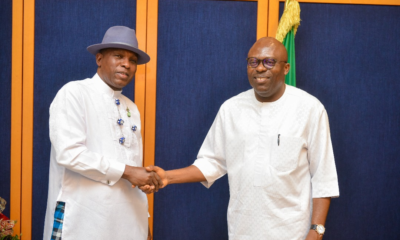
 Featured3 days ago
Featured3 days agoDraw Up Futuristic Policies To Strengthen Governance, Fubara Tells NISS Team …Says Rivers’ll Deploy AI To Drive Dev, Tackle Political Crisis
-
News3 days ago
Drama As Senators Jostle For Seats In Newly Renovated Chamber
-
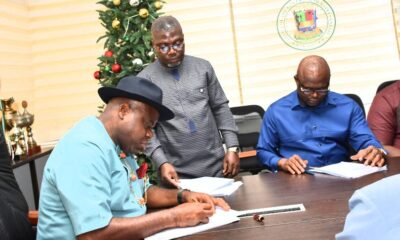
 Niger Delta3 days ago
Niger Delta3 days agoDiri swears in 14 Commissioners, Revenue Chairman

